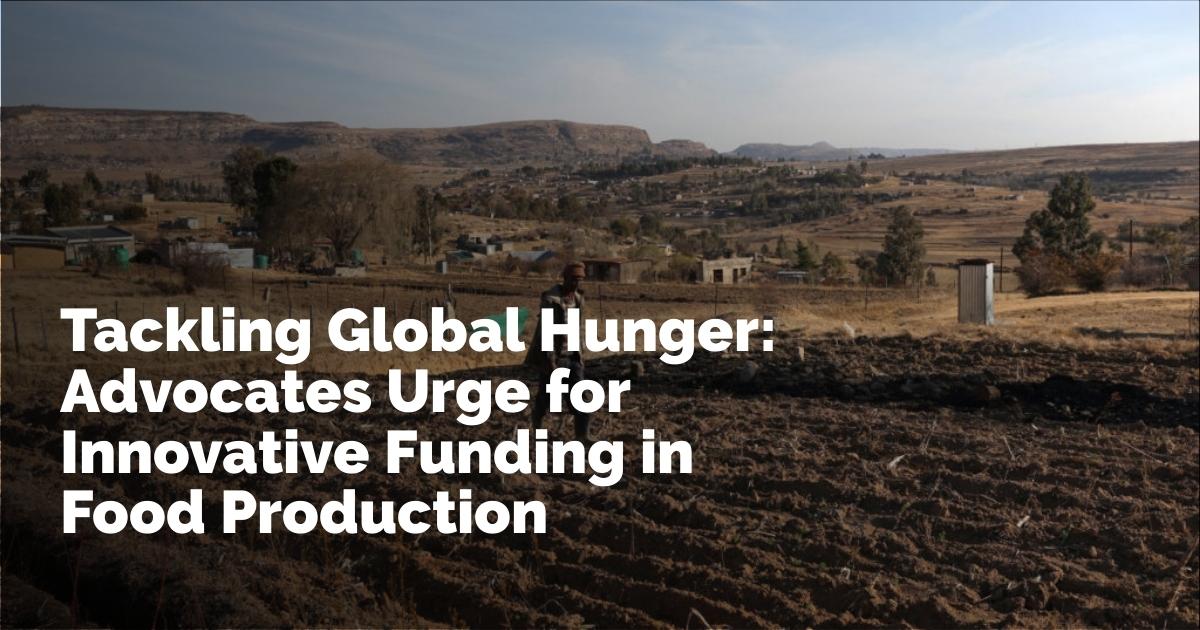Global Hunger Crisis: The Urgent Call for Agricultural Transformation
Global hunger remains a persistent and daunting challenge, with advocates urging a transformative approach to agriculture and food production. As the world grapples with the interconnected issues of climate change, food insecurity, and economic instability, the need for substantial financial investment and innovative solutions is increasingly pressing.
Agriculture at the Forefront of Climate Conversations
Agriculture and food systems are gaining prominence on the global stage, particularly in climate discussions. According to Kaveh Zahedi, Director of the Office of Climate Change, Biodiversity, and Environment at the Food and Agriculture Organization (FAO), food security has finally become an integral part of dialogues around climate policy, especially as the world anticipates COP29. This shift in focus is crucial, considering how deeply intertwined food systems are with climate and environmental changes.
The Escalating Hunger Epidemic
Despite declining hunger rates in previous decades, the past three years have witnessed stubbornly high levels of global hunger. The FAO's annual report highlights an alarming 773 million people facing acute hunger. Political conflicts, economic instability, and the COVID-19 pandemic have exacerbated these numbers. In Africa, one in five people face food scarcity, while conflicts in regions like Sudan and Ukraine further exacerbate the crisis by disrupting food supplies and inflating prices.
The Climate Change Factor
Increasingly, climate change is recognized as a primary driver of food insecurity. Extreme weather events, fueled by climate change, significantly impact crop yields and agricultural productivity. Gernot Laganda of the United Nations World Food Program (WFP) notes that 71.9 million people in 18 countries face acute food insecurity due to weather-related incidents. The growing challenge is evident in areas like Africa, Latin America, and parts of Asia, regions particularly vulnerable to climate extremes.
Building Resilience Through Pre-emptive Action
A critical recommendation from global food agencies is to adopt a proactive rather than reactive approach to hunger relief. The current funding model in international aid is predominantly reactionary, with only a fraction of funds allocated in anticipation of crises. Experts emphasize the importance of investing in predictive forecasting and pre-positioning resources in high-risk areas. This strategy would allow communities to better prepare for climate and economic shocks, potentially mitigating the adverse impacts on food security.
The Role of Financial Investment in Agriculture
The upcoming sessions at COP29 and other international forums will focus heavily on financing strategies to support climate adaptation in agriculture. There is a growing consensus that more funding should be directed to help farmers adapt to the changing climate. By investing in resilient agricultural practices, such as selecting drought-tolerant crops and enhancing soil health, farmers can better withstand environmental stresses.
The Promise of Regenerative Agriculture
Regenerative agriculture, though variably defined, holds promise for making agricultural systems more sustainable and resilient. Key aspects include improving soil fertility, enhancing biodiversity, and ensuring the well-being of farmers. However, current government subsidies largely favor intensive agriculture and major commodity production, which are more harmful to the environment. Redirecting these funds toward regenerative practices could foster more sustainable and diverse food systems, which are inherently more resilient to climate adversities.
Diversification of Food Systems
Diversification is a crucial element in building resilience. Globally, dependency on a narrow range of crops increases vulnerability to climate impacts. Diversified farming systems, on the other hand, are better equipped to handle environmental and economic disruptions. Greater crop variety not only supports ecological balance but also fortifies communities against potential food shortages.
Concluding Thoughts
As global hunger continues to challenge humanitarian goals, a comprehensive overhaul in the way food is produced and distributed is essential. Advocates call for increased and targeted funding to bring about resilient agricultural practices globally, with a focus on sustainability and adaptation to climate change. By prioritizing investment in adaptive measures and regenerative agriculture, there is an opportunity to make significant strides in tackling global food insecurity and ensuring a more sustainable future for all.
출처 : Original Source

